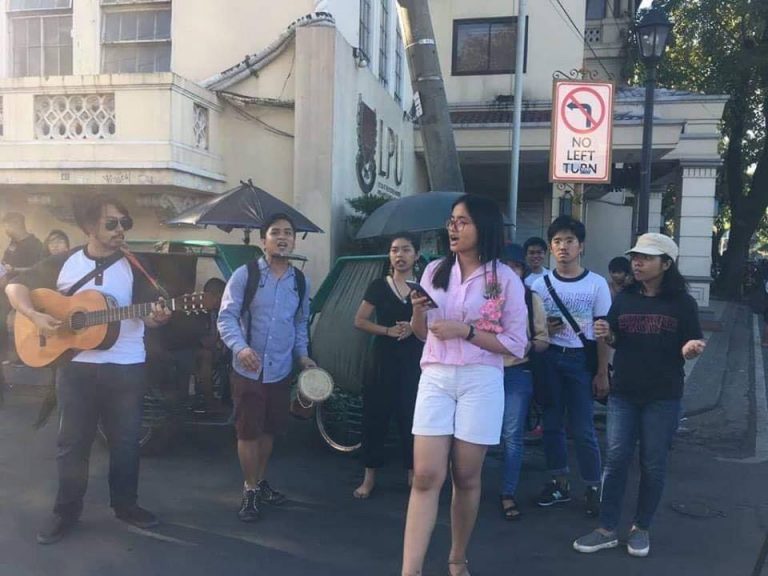
“Ang sariling wika ang magpapalaya sa gapos ng tanikala,” said regional cultural alliance Sining Bugkos and Kabataan Party-list Metro Manila in their cultural caravan that visited various universities in Metro Manila on Wednesday, November 14, to assail the recent Supreme Court decision.
The Supreme Court (SC) decision upheld the removal of Filipino and history subjects in the college curriculum as per stated in the Commission on Higher Education’s (CHED) memorandum order 20, Series of 2013.
Art as protest
The removal of Filipino language and history subjects in the college curriculum is a direct attack to the culture and education of the Filipino youth, according to youth group Kabataan Party-list Metro Manila.
“The Supreme Court’s decision to uphold CMO 20 series of 2013 manifests its inclination to uphold the colonial orientation of the current system of education. It is an utter disregard to our culture and sends out a message that indicates that our country would rather focus on prioritizing other languages than nurture our own,” said the group’s regional spokesperson Pat Cierva.
A cultural caravan geared to protest the impending implementation of the memorandum order, WIKAravan, was launched today in various universities. The caravan visited University of the Philippines Manila, Mapua University, and Far Eastern University.
Sining Bugkos said they hoped to impart a message on the importance of language and culture as a weapon for continued struggle and resistance.
Drastic implications
In a statement, youth writers’ group Liga ng Kabataang Propagandista (LKP), a group affiliated with Sining Bugkos, blasted the SC decision, citing that “the decision is traitorous and geared to favor only the State and foreign investors.”
“Wika ang pangunahing salamin at pagkakakilanlan ng kultura ng bawat lahi. Walang anumang wika ang makapagpapa-unlad sa ating bayan kundi ang sarili nitong wika. Dapat hubugin at linangin ang kaalamang makabayan at magpakadalubhasa sa ating wika at gamitin ito sa paglinang sa ating isipan para ikauunlad ng bayan,” LKP stated.
(“Language serves as a primary reflection and identity of the culture of the people. There is no other language which could develop our country besides our own native tongue. As such, it must be molded and enrich patriotism. We must be skilled in our own language and use it to nourish our minds for the development of our own nation.”)
“Bukod dito, hindi lamang ang mga estudyante ng hinaharap ang makararanas ng pait sa desisyong ito kundi maging ang mga guro sa kasalukuyan na nangangambang mawalan ng hanap-buhay dahil dito. Ang pagtindig ng Korte Suprema sa CHED MEMO 20 ay pagkitil nito sa ating pakakakilanlan. Tinanggalan tayo ng ating kultura at pilit isinusubo sa ating mga bibig ang wika ng ibang bayan,” LKP continued.
(“Students are not the only casualties in this decision for it will also affect the educators who are on the brink of losing their source of livelihood. SC’s stance on CHED Memo 20 is killing our identity. It eradicates our culture and forces us to imbibe the language of other countries.”)
Teachers’ protest
Meanwhile, according to Tanggol Wika, the alliance of educators and advocates of the Filipino language who filed the Temporary Restraining Order (TRO) on CMO 20 in 2015, manifested that 10,000 teachers were bound to lose their jobs or face reduced teaching loads due to the decision, a sentiment that is shared by the youth and cultural groups behind WIKAravan.
“The youth, along with the cultural workers, the educators, and the larger groups of masses shall continue to wage campaigns to drumbeat this issue. We will not be silenced by this attempt to further bastardize our education and our future. We shall continue to unite with other people who share our causes. This decision, a product of our colonial education, will only serve as our fuel to advocate for an education that is nationalist, scientific, and mass-oriented. One that is geared to develop the nation and not to paralyze it into submission to other dominant foreign countries.” Cierva ended.
The post Youth and artist groups use art to assail decision to remove Filipino language in college curriculum appeared first on Manila Today.